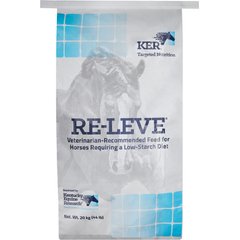Polysaccharide Storage Myopathy (PSSM) in Horses
What Is PSSM in Horses?
Polysaccharide Storage Myopathy (PSSM) is a disease that results in the abnormal accumulation of glycogen (a form of sugar that is stored in muscles) which causes painful muscle cramping or tying up.
There are two types of PSSM:
Type 1 PSSM: caused by a genetic mutation in the GYS1 gene and can be inherited. PSSM Type 1 has been identified in over 20 horse breeds.
Type 2 PSSM: occurs in horses without a genetic mutation and is more commonly seen in warmbloods.
Today, halter bred Quarter horses seem to have the largest prevalence of PSSM1 with about 28% affected and the general Quarter horse population prevalence closer to 6-10%. Other breeds that may be affected include Paint and Appaloosa horses with about 6-8% prevalence. Arabians and Thoroughbreds have a very low prevalence.
Symptoms of PSSM in Horses
Clinical signs of PSSM include:
-
Soreness
-
Weakness
-
Cramping
-
Muscle stiffness
-
Reluctance to move
-
Sweating
-
Shifting lameness
-
Muscle tremors
-
Firm/hard muscles
-
Pawing
-
Rolling
-
Poor performance
In rare cases horses may exhibit more severe signs such as the following:
-
Unable to stand
-
Uncomfortable while lying down
-
Urine may be dark brown or red colored (due to muscle proteins being broken down and released into the bloodstream)
If your horse shows any of the above symptoms, call your veterinarian right away as this is an emergency and can be life-threatening.
Causes of PSSM in Horses
Type 1 PSSM is caused by a genetic mutation in the GYS1 gene. Every horse has two copies of the GYS1 gene, one they receive from their dam and the other from their sire.
Horses only need one defective copy of the GYS1 gene to be affected. The GYS1 gene is important in the production of glycogen (the sugar stored in a horse’s muscles). The mutation seen in PSSM1 horses causes the muscle cells to continue to make and store glycogen abnormally. As a result, during exercise horses are not able to access the extra glycogen needed for energy. The muscle cells enter an energy deficit state due to the imbalance of production and breakdown of glycogen. This results in “tying up” of the muscles.
Type 2 PSSM is a type of PSSM that is not due to a genetic mutation. The cause or causes are currently unknown. This type of PSSM is most commonly seen in warmblood horses but can also be seen in Quarter horses, (often performance horses such as barrel racing, reining, and cutting horses) Morgans, Arabians, Standardbreds, and Thoroughbreds.
Horses with PSSM also tend to be more sensitive to insulin. Insulin is the hormone that controls blood sugar levels in animals. When a horse ingests sugar from their diet, it stimulates the pancreas to produce more insulin. Because of this response, insulin can worsen PSSM symptoms because it removes the glucose from the circulating blood system too quickly, which causes the GYS1 gene to produce more abnormal glycogen.
If you believe your horse is tying up, it is best to do the following:
-
If your horse becomes reluctant to move, stop exercise immediately and move to a box stall.
-
Call your veterinarian immediately.
-
In cold weather, you may want to blanket your horse. If it is warm and your horse is sweating, hose the horse off to help keep them cool.
-
Provide fresh water in small amounts for your horse to drink. Electrolytes may be provided if there are concerns of dehydration.
-
Do not feed any grain. Only provide small amounts of hay until symptoms subside.
-
Your veterinarian may recommend giving your horse a dose of Banamine® for pain until they are able to be seen for further treatment. NOTE: only give Banamine® if instructed to do so by your veterinarian as it can worsen kidney damage.
How Veterinarians Diagnose PSSM in Horses
To diagnose PSSM, your veterinarian will start with an exam. Because horses can exhibit similar symptoms to colic when they are tying up, it is important to be able to distinguish the difference. Bloodwork can help with distinguishing muscle pain/stress from abdominal pain.
Blood work for a horse with PSSM will show elevated levels of the two muscle enzymes, creatine kinase (CK) and aspartate aminotransferase (AST). For a definitive diagnosis pf PSSM Type 1, your veterinarian may recommend following up this testing with a genetic test from either a hair or blood sample.
PSSM2 can only be diagnosed through muscle biopsy. A muscle biopsy should be considered if you have a horse that has had tying up episodes and has tested negative for PSSM1.
Treatment of PSSM in Horses
After a tying up episode, depending on the severity, horses are often initially placed on stall rest during the episode and are prescribed an anti-inflammatory pain medication such as Banamine® (flunixin meglumine).
With a severe episode, intravenous fluids may also be required to help flush out muscle proteins that are excreted from damaged muscle cells in the kidneys, since these can cause irreversible damage. Muscle relaxants and sedation such as acepromazine may also be given to help with recovery.
During this time, horses should only be fed hay and avoid any grain. It may be recommended to start a horse with PSSM on a vitamin E supplement, such as Nano-E by Kentucky Equine Research®, an antioxidant that helps with muscle soreness and recovery.
Once the initial episode has passed and the horse is willing to walk and move around freely again, it is important to allow the horse access to a small paddock or hand walking. A slow re-introduction to exercise should begin after an acute episode of tying up with consistent daily exercise and a slow buildup of time increments per day. Duration of exercise is more important than restricting the intensity of the exercise.
Recovery and Management of PSSM in Horses
Typically, horses can fully recover from tying up episodes and can go back to their normal routine. Strict rest has been shown to be counterproductive for horses with PSSM following an episode, and it is best that they have daily exercise. While there is no cure for PSSM, management can be done through exercise and adhering to a strict diet.
Regular daily exercise, as well as minimizing the number of days a horse goes without any form of exercise is extremely important for the management of PSSM Type 1. PSSM Type 2 horses benefit from prolonged warm-up and stretching. Providing periods of rest during exercise for a horse to relax and stretch is also beneficial while under saddle.
Horses with PSSM Type 1 should be placed on a strict diet to decrease the amount of sugar content they ingest. As grass can contain a lot of quick burning sugars, horses with PSSM Type 1 may need to be turned out in a dry lot or a limited amount of pasture time with a grazing muzzle. Hay selection should be chosen based on its nonstructural carbohydrate content (NSC) of 12% or less. Low starch high fat feeds such as Re-Leve® are ideal for horses with PSSM Type 1 as they provide a high fat content to help with caloric intake while keeping the sugar levels low.
Severe tying up episodes can cause kidney damage which can be life-threatening. Other milder conditions that PSSM can lead to include:
-
Decreased performance
-
Dehydration
-
Lethargy
-
Stress
-
Behavior changes (grumpy with exercise)
Preventing PSSM in Horses
Ultimately the best way to prevent PSSM Type 1 in horses is through genetic testing on any horse you are considering in a breeding program. Since PSSM Type 1 is autosomal dominant (meaning they only need one defective copy of the gene to have the trait) it is important to avoid breeding a horse that has even just one PSSM1 gene.
AQHA has a great 5 panel genetic test that requires sending off hair to test for PSSM1 as well as HYPP, MH, GBED, and HERDA. Your primary veterinarian can also take a blood or hair sample and send to a local lab for genetic testing. The cause of PSSM Type 2 is still unknown, so there are currently no recommendations on genetic prevention.
To help reduce the risk of tying up episodes for horses with PSSM Type 1 or 2, management is key. Daily exercise and a low sugar diet has shown to decrease or prevent episodes in more than 75% of horses diagnosed with PSSM.
PSSM in Horses FAQs
Can you ride horses with PSSM?
Yes. Horses with PSSM can be ridden and can do well when restricted diets and daily exercise routines are implemented.
What breeds get PSSM?
Over 20 horse breeds have been seen to have PSSM Type 1 with Quarter horses being one of the most prominent. Warmbloods are often more likely to have PSSM Type 2.
How is PSSM treated?
PSSM is treated through management practices of a low starch/carb diet and regular daily exercise. Episodes of tying up may be treated short-term by your veterinarian with a combination of sedatives, pain medications, muscle relaxants and non-steroidal anti-inflammatory drugs.
References
1. University of Minnesota Extension. Polysaccharide storage myopathy (PSSM) in horses.
2. The College of Veterinary Medicine at Michigan State University. Type 1 Polysaccharide Storage Myopathy.
3. Kentucky Equine Research. Update: PSSM in Horses. 2011.
Featured Image: iStock.com/camaralenta




